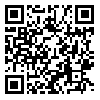Volume 11, Issue 2 (6-2019)
2019, 11(2): 18-28 |
Back to browse issues page
1- Shahrekord University
2- Shahrekord University , m.a.mohammadi@eng.sku.ac.ir
2- Shahrekord University , m.a.mohammadi@eng.sku.ac.ir
Abstract: (1401 Views)
We consider a cooperative spectrum sharing non-orthogonal multiple access (NOMA) network, where a
secondary transmitter assists transmission from a primary transmitter to a primary receiver with poor channel
conditions, and at the same time transmits to a secondary receiver with strong channel conditions. The secondary
transmitter is assumed to be energy-constrained and powered by an energy access point located in its vicinity. In order
to cancel the self-interference at the full-duplex multi-antenna secondary transmitter, two zero-forcing (ZF)-based
beamforming schemes and a maximum ratio combining/maximum ratio transmission scheme are designed and the
corresponding outage probability analysis of the primary and secondary networks, are derived. Outage probability
results are used to study the delay-constrained throughput of the system. Our results suggest that by using ZF-based
beamforming schemes depending on the number of transmit/receive antennas at the full-duplex secondary transmitter
significant performance improvement can be achieved compared to the half-duplex counterpart. Moreover, our results
indicate that proposed ZF-based schemes achieves a zero-diversity order.
secondary transmitter assists transmission from a primary transmitter to a primary receiver with poor channel
conditions, and at the same time transmits to a secondary receiver with strong channel conditions. The secondary
transmitter is assumed to be energy-constrained and powered by an energy access point located in its vicinity. In order
to cancel the self-interference at the full-duplex multi-antenna secondary transmitter, two zero-forcing (ZF)-based
beamforming schemes and a maximum ratio combining/maximum ratio transmission scheme are designed and the
corresponding outage probability analysis of the primary and secondary networks, are derived. Outage probability
results are used to study the delay-constrained throughput of the system. Our results suggest that by using ZF-based
beamforming schemes depending on the number of transmit/receive antennas at the full-duplex secondary transmitter
significant performance improvement can be achieved compared to the half-duplex counterpart. Moreover, our results
indicate that proposed ZF-based schemes achieves a zero-diversity order.
Type of Study: Research |
Subject:
Communication Technology
| Rights and permissions | |
 | This work is licensed under a Creative Commons Attribution-NonCommercial 4.0 International License. |


